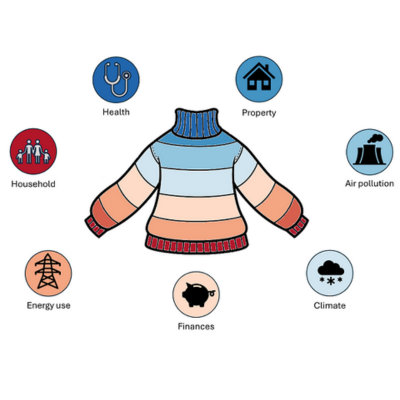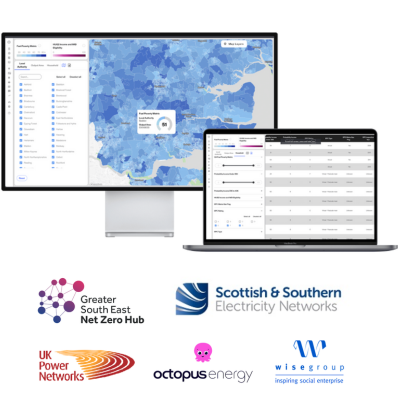UrbanTide Co-Founder, Steven Revill, began his career in intelligent transport systems almost two decades ago, before launching the company in 2014.
We spoke to Steven about what inspired him to launch a data technology business, how he envisions data and AI solving global challenges in the near future, and why he's joining the board of MaaS (Mobility as a Service) to represent Scotland at a critical time.
1. As Co-Founder of UrbanTide, what inspired you personally to focus on using technology for social good?

My inspirations have definitely evolved. Originally, the passion was fuelled by the knowledge that data could help society be more efficient - if used properly. It was (and still is at times) wasted as an asset.
But in the last 3-4 years (since the pandemic), the need to be using data and technology in this way has felt a lot more urgent. As a global society, there are increasing social problems, increasing polarisation of wealth, and a complete lack of abatement on profits driving growth. Social media is fantastic for so many reasons, but it's also polarising society and speeding up some of our biggest problems, in my opinion. I feel we need to be investing much more in tackling inequalities and addressing problems.
The pandemic showed how strong and united we can be around a cause (public health). We need to apply that to addressing social problems and addressing climate change. That's what inspires me at the moment.
2. How do you see the role of AI in addressing global challenges evolving over the next decade?
If AI can help consumers do their bit in addressing climate change, that would be the most exciting thing for me. And by that, I mean taking solutions to the mass market which are about creating that social and environmental difference and not prioritised by making money.
I think ethical AI can help do that. From delivering targeted messaging that makes people act, to applying the technology to identify areas of opportunity. I actually think we need AI to help us address global challenges.
3. In the last 10 years of running this company, have you seen attitudes change regarding using open data and AI for public good?
Absolutely. It probably goes without saying, but over the last 2-3 years in particular, the terminology of AI has become commonplace. While some see it as a bit of a scary technology, it has become mainstream and governments are increasingly setting rules to try and ensure its uses are ethical. It’s largely expected that a technology company will be at least using, if not building its own AI now.
Open data is a bit of a different story. The EU has made small but purposeful steps forward across the board whereas in the UK, pockets of better practice are emerging (e.g. Bus Open Data) but the general movement has been backward, unfortunately.
4. You're about to join the board for Mobility as a Service (MaaS). What do you see as the main barriers to MaaS adoption right now?
I think you have to put it down to a lack of national leadership, because in countries where MaaS has worked, strong leadership has been a strong element.
The ideas are all really good, and have been around for a long time, but then the activity and the action hasn't replicated the ideas.
In Scotland, there's a situation where there's a lack of proper leadership of where to go next.
Transport Scotland, the rail and the bus companies still don't really talk to each other properly. You still hear companies saying they don't want to do integrated ticketing, where you would just get on a bus and get off a train at the other end, and not really think about it, rather than getting on one bus, paying a fare, than paying another fare on a train.
If you look at London, for example, where MaaS is working effectively, Transport for London operates and runs everything. So they can enforce that.
In Scotland, on the other hand, there's a lack of regulation and enforcement which makes MaaS adoption much harder. If we could mandate certain elements for bus companies and rail operators - like sharing data or sharing fair information, for example, or getting the ticket systems to talk to each other - this would have a big impact. Without that regulation mandate, nothing much can happen.
5. What unique perspectives or experiences from your work with UrbanTide do you hope to bring to the table as a new MaaS board member? How do you plan to make an impact?
Our expertise in data is really valuable in situations where national implementation is needed. You can already see from the amazing work we've done with Cycling Scotland – where we now have access to multi-modal active travel data across the whole of Scotland – how integral data can be in developing transport infrastructure.
I think it’s also important for UrbanTide to be present on the board to show our passion for Scotland. We want to offer our expertise to a forum that's looking to influence policy in Scotland, and that will be my main goal in joining.
6. Why is MaaS so important right now?
Getting mobility right is a critical component of the future of our world. From a net zero perspective, we need mobility to be better. We need emissions to reduce, and COVID effectively set that back because people started relying on private cars more and they haven't shifted back as much to transport as they had before.
People aren’t using public transport as much, and from an overall goal of net zero perspective, that's critical.
7. How does the work UrbanTide is doing in the transport sector feed into the company’s wider mission?
Our data solutions are helping to address poverty, and that includes transport poverty. People not being able to afford to get to the places that they need to go is a bigger problem than it was 10 years ago, too. We know our technology can help with that.
We can’t be working towards a sustainable world if we're not thinking of mobility and how that links with energy and how that links with people and cities and rural communities.
Follow Steven on LinkedIn or subscribe below for monthly UrbanTide newsletter updates.






